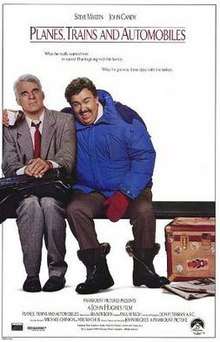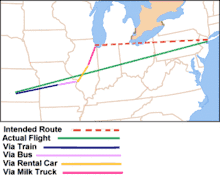Planes, Trains and Automobiles
| Planes, Trains and Automobiles | |
|---|---|
 Theatrical release poster | |
| Directed by | John Hughes |
| Produced by | John Hughes |
| Written by | John Hughes |
| Starring | |
| Music by | Ira Newborn |
| Cinematography | Donald Peterman |
| Edited by | Paul Hirsch |
Production company |
Hughes Entertainment |
| Distributed by | Paramount Pictures |
Release date |
|
Running time | 92 minutes[1] |
| Country | United States |
| Language | English |
| Budget | $30 million |
| Box office | $49.5 million |
Planes, Trains and Automobiles is a 1987 American comedy film written, produced, and directed by John Hughes. The film stars Steve Martin as Neal Page, a high-strung marketing executive, who meets Del Griffith, played by John Candy, an eternally optimistic, outgoing, overly talkative, and clumsy shower curtain ring salesman. They share a three-day odyssey of misadventures trying to get Neal home to Chicago from New York City in time for Thanksgiving with his family.
Plot
Neal Page is an advertising executive on a business trip in New York on his way home to his family in Chicago for Thanksgiving. After having participated in a tedious meeting ending without a decision, Neal attempts to hail a cab during rush hour. The efforts prove meaningless and Neal is further delayed after having his cab inadvertently stolen by Del Griffith, a loquacious traveling salesman who sells shower curtain rings, while paying a greedy lawyer for it. Neal and Del meet again at La Guardia Airport, where they board a plane to O'Hare. Their plane is diverted to Wichita due to a blizzard in Chicago.
Neal, having realized that he has to spend the night in Wichita, agrees to accompany Del to a cheap motel. During the night, Neal loses his temper with Del and lambastes him. In response, Del admits that he regards Neal as a cold cynic and says that despite how Neal feels, he likes himself and his wife and customers like him. Neal calms down and the two men go to sleep. During the night their cash is stolen by a burglar.
The following day they attempt to reach Chicago by train. The two, much to Neal's relief, finally part ways, but the locomotive breaks down, leaving the passengers stranded in a Missouri field. After reaching Jefferson City, Del sells his remaining shower curtain rings to buy bus tickets, but neglects to tell Neal that they are only valid to St. Louis. Upon arrival, Neal inadvertently offends Del over lunch and the two part ways.
Neal attempts to rent a car, but finds the space at the distant rental lot empty. After walking all the way back to the airport terminal, Neal vents his anger at the rental agent to no avail. In desperation, he attempts to hail a taxi to Chicago, but insults the dispatcher, who then attacks Neal. By chance, Del shows up again, arriving just in time to rescue Neal with his own rental car. While driving, they find themselves arguing again. The situation is made worse when Del nearly gets them killed on a freeway after driving in the wrong direction, almost hitting two semi-trailer trucks.
While they take a moment to compose themselves by the side of the road, Del's carelessly discarded cigarette sets fire to the rental car's back seat. Neal initially gloats over Del's predicament, thinking that he is liable for the damage to the car. Neal's amusement turns to anger when Del reveals he used Neal's credit card to rent the car after their cards were accidentally switched.
With his credit cards destroyed in the car fire, Neal sells his designer watch to a motel clerk to pay for a room for himself. Del is broke and attempts to sleep in the car, which has lost its roof in the fire. Neal eventually feels sympathy for Del and invites him in from the cold and snowy night. Neal relaxes as the two consume Del's collection of airline liquors and laugh about the events of the past two days, finally making friends with Del. The pair resume driving to Chicago the next morning, but their badly damaged car is impounded by the police. They finally make it to Chicago, two days late, in the back of a refrigerator truck.
They part ways at the LaSalle/Van Buren CTA station. While riding the train, Neal remembers some of the cryptic comments Del made about his wife during the journey and realizes that Del may be alone for the holiday. Struck by compassion, he returns to the station, sees Del sitting by himself and asks why he has not gone home. Del reveals that he does not have a home and that his wife died eight years earlier. Neal returns home to his family and introduces them to Del, whom he has invited to Thanksgiving.
Cast

- Steve Martin as Neal Page
- John Candy as Del Griffith
- Laila Robins as Susan Page
- Michael McKean as State Trooper
- Kevin Bacon as Taxi Racer
- Dylan Baker as Owen
- Olivia Burnette as Marti Page
- Larry Hankin as Doobie
- Richard Herd as Walt
- Matthew Lawrence as Neal Page, Jr.
- Edie McClurg as Car Rental Agent
- Bill Erwin as Man on Plane
- Ben Stein as Wichita airport representative
- Diana Dill as Peg
- Charles Tyner as Gus Mooney
Reception
The film marked a widely noticed change in the repertoire of John Hughes.[2] It was greeted with critical acclaim upon release, a revelation in that Hughes was considered a teen angst filmmaker.[3] It also got two thumbs up from Siskel & Ebert, with Siskel declaring it John Candy's best role to date. It has 92% positive ratings on Rotten Tomatoes and is featured in Roger Ebert's Great Movies collection. Ebert said the movie was "... perfectly cast and soundly constructed, ..."[4]
Casey Burchby of DVD Talk said, "John Hughes, like a lot of other filmmakers who specialized in comedy during the 1980s, knew how to explore a varied range of tones in crafting a full-bodied movie that went well beyond the one-note comedies that are par for the course. Hughes took comedy subgenre such as the teen film, the buddy movie, the family comedy, and the road film, and boosted these flattened-out, cliché-bound stories with robust characters capable of generating believably absurd cinematic situations. Planes, Trains & Automobiles displays Hughes' powers at their height, as well as Steve Martin and John Candy in two of their very best roles."[5]
While some reviewers were critical of the gushy tones and silliness seen in the movie, which affected the ability to convey emotional range,[3] most applauded the humor itself.[6][7][8][9] Leonard Maltin called the movie a "bittersweet farce," adding that Hughes "refuses to make either one (Martin or Candy) a caricature—which keeps this amiable film teetering between slapstick shenanigans and compassionate comedy."[10] Maltin added that the movie was "hurt by an awful music score."[10]
Box office
The movie opened in American theaters on November 25, 1987 (a Wednesday) and finished third for the weekend, grossing $7,009,482. After its first five days, the film grossed $10,131,242 and stayed in the top ten for seven weeks. The movie finished its American run on January 22, 1988 with $49,530,280 after a twelve-week run.[11] on a production budget of almost $30 million.[12]
Soundtrack
| Original Motion Picture Soundtrack: Planes, Trains and Automobiles | |
|---|---|
| Soundtrack album | |
| Released | 1987 |
| Genre |
Rock and roll Country Pop |
| Length | 34:32 |
| Label | MCA |
The soundtrack to Planes, Trains & Automobiles features a mix of rock and roll, country and pop. The frenetic musical score by Ira Newborn makes extensive use of the folk song "Red River Valley", including a rock and roll version of the song "Red River Rock", performed by British group Silicon Teens. Among other tracks is a cover version of "Back in Baby's Arms". The song, popularized by Patsy Cline, is performed by Emmylou Harris. Another popular song used in the movie is "Mess Around" written by Ahmet Ertegun and performed by Ray Charles.
The soundtrack album was released in 1987, but has since gone out of print. It is currently available for download on iTunes.[13] or is available on Spotify.
References
- ↑ "Planes, Trains and Automobiles (15)". British Board of Film Classification. December 7, 1987. Retrieved 2013-05-14.
- ↑ 'PTA' Transports John Hughes Beyond His Teen Comedy Image; [Home Edition] JACK MATHEWS. Los Angeles Times (pre-1997 Fulltext). Los Angeles, Calif.: December 15, 1987. pg. 1
- 1 2 'PLANES, TRAINS' NEVER GETS OFF THE GROUND; [THIRD Edition] Jay Carr, Globe Staff. Boston Globe (pre-1997 Fulltext). Boston, Mass.: November 25, 1987. pg. 34
- ↑ Roger Ebert (November 12, 2000). "Planes, Trains and Automobiles".
- ↑ Casey Burchby. "Planes, Trains and Automobiles". DVD Talk. Retrieved 2011-08-07.
- ↑ PLANES, TRAINS' A PERFECTLY GOOFY COMEDY VEHICLE; [3 STAR Edition] Jay Boyar, Sentinel Movie Critic. Orlando Sentinel. Orlando, Fla.: November 27, 1987. pg. D.1
- ↑ Flights of comedy, down-to-earth characters Martin and Candy are on a roll in 'Planes, Trains and Automobiles' MICHAEL JANUSONIS Journal-Bulletin Arts Writer. Providence Journal. Providence, R.I.: November 27, 1987. pg. D-04
- ↑ Maslin, Janet (November 25, 1987). "Planes, Trains and Automobiles (1987)". The New York Times.
- ↑ Richard Schickel (November 30, 1987). "Worst-Case Scenario.Planes, Trains and Automobiles". Time magazine.
- 1 2 Martin, Leonard (2006). Leonard Maltin's Movie Guide. Signet Books. p. 1009. ISBN 0-451-21265-7.
- ↑ "Planes, Trains and Automobiles (1987) - Box Office Mojo".
- ↑ Terri Minsky, July 1988, Premiere magazine
- ↑ iTunes Store Retrieved 2014-12-14.
External links
| Wikiquote has quotations related to: Planes, Trains and Automobiles |